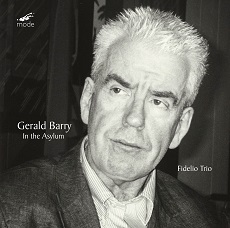Le Vieux Sourd for piano + Baroness von Ritkart for violin and piano +
In the Asylum for piano trio + Ø for piano quartet + Triorchic Blues for piano trio; Fidelio Trio (Darragh Morgan, Violine, Mary Dullea, Klavier, Adi Tal, Cello); 1 CD Mode Records 332; Aufnahme 08.2018, Veröffentlichung 06.2022 (63') - Rezension von Remy Franck
Das Fidelio Trio spielt ein Programm mit hauptsächlich Erstaufnahmen von Werken des irischen Komponisten Gerald Barry (*1953). Barry, der bei Karlheinz Stockhausen, Mauricio Kagel und Friedrich Cerha studierte, ist für seine Opern bekannt, hat aber auch einige Orchesterwerke und viel Kammermusik geschrieben.
« Barrys Musik klingt in ihrer diamantenen Härte, ihrem Humor und gelegentlich ihrer Gewalttätigkeit wie die keines anderen Komponisten », urteilte der Guardian, und das ist, was die beiden ersten Attribute anbelangt, gleich im ersten Stück dieser CD, 1998, für Violine und Klavier, nachzuvollziehen. Darauf folgt das in seiner minimalistischen Ausdrucksweise urkomische Klavierstück All day at home busy with my own affairs, dessen Verlängerung Midday für Violine und Klavier sein könnte, obschon dieses Werk ein Jahr vorher entstand. Es erinnert zunächst an einen tropfenden Wasserhahn, soll sich aber eigentlich auf die Landung der Normannen an der südostirischen Küste im Jahr 1169 beziehen, wobei die Musik die Stille und die Gedanken von jemand zu beschreiben scheint, der das ruhige Meer beobachtet und nach den Schiffen Ausschau hält.
Nach Slapstick-Manier ist Le Vieux Sourd (Der alte Taube) komponiert. Das war Debussys Spitzname für Beethoven. Das Stück ist ein Arrangement der Melodie Auld Lang Syne, die auch Beethoven arrangiert hat. Über das minimalistische knapp drei Minuten lange Stück Baroness von Ritkart sagt Barry: « I came across the Baroness in Chekhov. The piece is in three movements. Clever, noble, but not talented – Talented, noble, but not clever – Talented, clever, but not noble », wobei die Umdrehungen auch musikalisch von unwiderstehlichem Humor sind.
Das total schräge Klaviertrio In the Asyslum beruht auf Missverständnissen in einem Gespräch und endet mit einer parodistisch verzerrten Anspielung auf God Save the Queen.
Von seltsam stillem Humor ist das Klavierquartett Ø, während der in verschiedenen Versionen existierende Triorchic Blues in der Trio Version einfach die Fassungen für Solovioline, Soloklavier und Solocello simultan verwendet. Er bezieht sich auf den Kastraten Giusto Fernando Tenducci, der in Neapel, London und Dublin sang, in Paris aber auch Mozart im gesang unterrichtete. Casanova zufolge war Tenducci triorchisch, hatte also drei Hoden… Barrys Musik könnte dementsprechend das hektische Treiben der Spermien in eben diesem dritten Hoden sein, wobei das hier wie in allen Stücken exzellent spielende Fidelio Trio die Musik frenetisch bis vor die Ejakulation steigert. Das Stück erinnert mich an den Song 300 Millions der Frères Jacques….
The Fidelio Trio performs a program of mainly premiere recordings of works by Irish composer Gerald Barry (*1953). Barry, who studied with Karlheinz Stockhausen, Mauricio Kagel and Friedrich Cerha, is known for his operas, but has also written several orchestral works and much chamber music.
« The Irish composer’s work is distinctive in its diamond-like hardness, its humour and, sometimes, its violence, » the Guardian said, and that’s evident, as far as the first two attributes are concerned, right from the first piece on this CD, 1998, for violin and piano. This is followed by the piano piece ‘All day at home busy with my own affairs’, hilarious in its minimalist expression, whose extension could be Midday for violin and piano, although this work was written a year earlier. At first reminiscent of a dripping faucet, it is actually meant to refer to the landing of the Normans on the southeastern coast of Ireland in 1169, with the music seeming to describe the stillness and the thoughts of someone watching the calm sea and looking out for the ships.
In slapstick fashion, Le Vieux Sourd (The Old Dove) is composed. This was Debussy’s nickname for Beethoven. The piece is an arrangement of the tune Auld Lang Syne, which Beethoven also arranged. Of the minimalist piece Baroness by Ritkart, just under three minutes long, Barry says, « I came across the Baroness in Chekhov. The piece is in three movements. Clever, noble, but not talented – Talented, noble, but not clever – Talented, clever, but not noble » where the turns are also musically of irresistible humor.
The totally weird piano trio In the Asyslum insists on misunderstandings in a conversation and ends with a parodically distorted reference to God Save the Queen.
The Piano Quartet Ø is of one strangely quiet humor, while Triorchic Blues, which exists in several versions, simply uses the solo violin, solo piano, and solo cello versions simultaneously in the trio version. It refers to the castrato Giusto Fernando Tenducci, who sang in Naples, London and Dublin, but also taught Mozart to sing in Paris. According to Casanova, Tenducci was triorchic, meaning he had three testicles… Barry’s music could accordingly be the frantic activity of sperm in the third of those testicles, with the Fidelio Trio, playing excellently here as in all the pieces, frenetically heightening the music to the point of ejaculation. The piece reminds me of the song 300 Millions by the Frères Jacques….


















